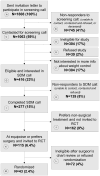A population-based, shared decision-making approach to recruit for a randomized trial of bariatric surgery versus lifestyle for type 2 diabetes
- PMID: 23911345
- PMCID: PMC3823665
- DOI: 10.1016/j.soard.2013.05.006
A population-based, shared decision-making approach to recruit for a randomized trial of bariatric surgery versus lifestyle for type 2 diabetes
Abstract
Background: Randomized trials of bariatric surgery versus lifestyle treatment likely enroll highly motivated patients, which may limit the interpretation and generalizability of study findings. The objective of this study was to assess the feasibility of a population-based shared decision-making (SDM) approach to recruitment for a trial comparing laparoscopic Roux-en-Y gastric bypass surgery with intensive lifestyle intervention among adults with mild to moderate obesity and type 2 diabetes.
Methods: Adult members with a body mass index (BMI) between 30 and 45 kg/m(2) taking diabetes medications were identified in electronic databases and underwent a multiphase screening process. Candidates were given a telephone survey, education about treatment options for obesity and diabetes using decision aids, and an SDM phone call with a nurse practitioner, in addition to standard office-based consent.
Results: We identified 1808 members, and 828 (45.7%) had a BMI of 30-34.9 kg/m(2). Among these, 1063 (59%) agreed to the telephone survey, 416 (23%) expressed interest in education about treatment options, and 277 (15%) completed the SDM process. The preferred treatment options were surgery (21 [8%]), diet and exercise (149 [53.8%]), pharmacotherapy (5 [2%]), none of the above (8 [3%]), and unsure (94 [34%]). Ultimately, 43 participants were randomly assigned to the trial. Significant differences, mainly related to sex, disease severity, and hypoglycemic medication use, were observed among people who did and did not agree to participate in our trial.
Conclusion: This population-based, SDM-based recruitment strategy successfully identified, enrolled, and randomly assigned patients who had balanced views of surgery and lifestyle management. Even with this approach, selection biases may remain, highlighting the need for careful characterization of nonparticipants in all future studies.
Keywords: Diabetes; Gastric bypass; Randomized trial; Recruitment; Shared decision making.
Copyright © 2013 American Society for Bariatric Surgery. Published by Elsevier Inc. All rights reserved.
Figures
References
-
- Dixon JB, O’Brien PE, Playfair J, et al. Adjustable gastric banding and conventional therapy for type 2 diabetes: a randomized controlled trial. Jama. 2008;299:316–23. - PubMed
-
- Mingrone G, Panunzi S, De Gaetano A, et al. Bariatric surgery versus conventional medical therapy for type 2 diabetes. N Engl J Med. 2012;366:1577–85. - PubMed
-
- Pories WJ, MacDonald KG, Jr, Morgan EJ, et al. Surgical treatment of obesity and its effect on diabetes: 10-y follow-up. Am J Clin Nutr. 1992;55:582S–5S. - PubMed
-
- Ha C, Ullman TA, Siegel CA, Kornbluth A. Patients enrolled in randomized controlled trials do not represent the inflammatory bowel disease patient population. Clin Gastroenterol Hepatol. 2012;10:1002–7. - PubMed
Publication types
MeSH terms
Grants and funding
LinkOut - more resources
Full Text Sources
Other Literature Sources
Medical
Molecular Biology Databases
Research Materials
Miscellaneous


